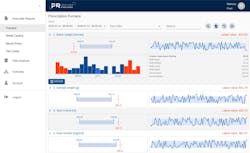Machine Learning Software Applications Continue to Expand
AI (artificial intelligence) and machine learning are making a stir all over the manufacturing and processing industries. With use cases ranging from allowing Motorola to more easily spot defects on printed circuit boards (PCBs) to helping Frito Lay produce a better potato chip, the technology, while young, has already begun to prove its value. Further potential applications include predictive maintenance, demand forecasting, and robot training, as well as overall process optimization.
Still, with only 1% of companies currently making use of machine learning, some feel widespread deployment may be several years off. All the same, as the cases of Motorola and Frito Lay demonstrate, machine learning success stories are beginning to emerge.
Enter DataProphet, a provider of AI-as-a-service, whose stated goal is to “proactively prescribe changes to plant control plans to continuously optimize production without the expert human analysis that is typically required.” The company claims its software products have helped customers reduce the cost of quality defects in manufactured products by an average of 40%.
In particular, DataProphet’s Prescribe, which is being used by several Tier-1 U.S. automotive suppliers, can allow manufacturers to predict defects, faults, and quality errors, while prescribing optimum control parameters to improve future production. According to the company, Prescribe can be integrated into an end-user’s existing data environment in as little as four to eight weeks.
Data used by Prescribe for its analytics can be pulled from various sources, including databases, spreadsheets, streaming sensors, and programmable logic controllers (PLCs). In addition, the software provides users with an intuitive web interface that helps them to identify when operational parameters have exceeded the target control bounds so that changes to optimize production and reduce scrap can be made.
“Traditionally, process control changes are reactive and rely on coordination across a changing team of process engineers, operators, plant managers, and support staff. Involving so many stakeholders means this process can take weeks or months,” said Frans Cronje, CEO at DataProphet. “However, real impact is only achieved with pre-emptive action because real-time is often too late. Our state-of-the-art machine learning models combine process data and quality control measurements from across many data sources to identify optimal control bounds which guide teams through every step of the process required to improve efficiency and cut defects.”
In addition to Prescribe, DataProphet also offers Detect and Connect. Detect provides predictive analytics, while Connect offers cloud storage, data management, and real-time dashboarding to ease the strain of digital transformation initiatives.

